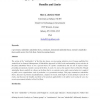Free Online Productivity Tools
i2Speak
i2Symbol
i2OCR
iTex2Img
iWeb2Print
iWeb2Shot
i2Type
iPdf2Split
iPdf2Merge
i2Bopomofo
i2Arabic
i2Style
i2Image
i2PDF
iLatex2Rtf
Sci2ools
89
Voted
I3E
2001
2001
Applying Stakeholder Theory to e-Government
The notion of the "stakeholders" of the firm has drawn ever-increasing attention since Freeman published his seminal book on Strategic Management: A Stakeholder Approach in 1984. In the understanding of most scholars in the field, stakeholder theory is not a special theory on a firm's constituencies but sets out to replace today's prevailing neoclassical economic concept of the firm. As such, it is seen as the superior theory of the firm. Though stakeholder theory explicitly is a theory on the firm, that is, on a private sector entity, some scholars try to apply it to public sector organizations, and, in particular, to e-government settings. This paper summarizes stakeholder theory, discusses its premises and justifications, compares its tracks, sheds light on recent attempts to join the two tracks, and discusses the benefits and limits of its practical applicability to the public sector using the case of a recent e-government initiative in New York State.
Related Content
| Added | 31 Oct 2010 |
| Updated | 31 Oct 2010 |
| Type | Conference |
| Year | 2001 |
| Where | I3E |
| Authors | Hans Jochen Scholl |
Comments (0)

